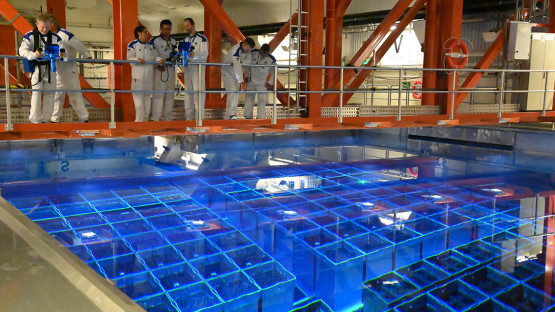In 2023, the IAEA conducted more than 3,000 in-field verification activities at over 1,300 nuclear facilities and ‘locations outside facilities’ around the world, according to the Safeguards Statement and Background for 2023, published recently. As a result of this verification effort, the IAEA was able to draw safeguards conclusions for 189 States with safeguards agreements in force.
IAEA safeguards verify countries’ commitments to use nuclear material and technology only for peaceful purposes. The Safeguards Statement presents the IAEA’s findings and conclusions for all countries for which the IAEA implemented safeguards during the year.
“During 2023, our safeguards inspectors spent over 14,000 calendar days at nuclear facilities and ‘locations outside of facilities’ to conduct nuclear verification activities,” said Massimo Aparo, IAEA Deputy Director General and Head of the Department of Safeguards. “This represents the IAEA’s critical mission to verify that the ever-growing amounts of nuclear material around the world remain in peaceful use.”
Of the 189 States where the IAEA implemented safeguards during the year, 181 had a comprehensive safeguards agreement in force, of which 136 also had an additional protocol in force. The additional protocol significantly increases the IAEA’s ability to verify the peaceful use of nuclear material by providing the Agency with access to additional safeguards relevant information, nuclear sites and locations.
Among the 136 States with a comprehensive safeguards agreement and an additional protocol in force, the IAEA was able to conclude that “all nuclear material remained in peaceful activities” for 74 countries. The IAEA drew this conclusion, also known as the ‘broader conclusion’, for the first time for Lesotho. For the other 62 countries, because evaluations regarding the absence of undeclared nuclear material and activities remained ongoing, the IAEA was only able to conclude that declared nuclear material remained in peaceful activities.
For the 45 States with a comprehensive safeguards agreement in force, but no additional protocol in force, the IAEA was also only able to conclude that declared nuclear material remained in peaceful activities.
As of the end of 2023, four States Parties to the Treaty on the Non-Proliferation of Nuclear Weapons (NPT) had yet to bring into force comprehensive safeguards agreements with the Agency. For these countries, the IAEA could not draw any safeguards conclusions.
For the countries with item-specific – rather than comprehensive – safeguards agreements in force (India, Israel and Pakistan), where the Agency does not have access to all nuclear facilities in the country, the IAEA concluded that “nuclear material, facilities or other items to which safeguards had been applied remained in peaceful activities”.
For the five officially acknowledged nuclear weapons States with voluntary offer agreements in force (China, France, Russia, the United Kingdom and the United States), again where the Agency does not have access to all nuclear facilities in the country, the IAEA concluded that “nuclear material in selected facilities to which safeguards had been applied remained in peaceful activities or had been withdrawn from safeguards as provided for in the agreements”.
During the year, a new comprehensive safeguards agreement with a small quantities protocol entered into force for Sao Tome and Principe. The protocol is based on the revised standard text for States with minimal or no nuclear material and without any existing or planned facilities. An additional protocol also entered into force for the Plurinational State of Bolivia and for Sao Tome and Principe.
As called for by the IAEA Board of Governors in 2005, the revised small quantities protocol reduces the number of provisions of the comprehensive safeguards agreement that are held in abeyance. In 2023, Nauru amended its original small quantities protocol accordingly, meaning that by the end of the year only 21 States still had operative small quantities protocols that had yet to be amended or rescinded.
During the year, the IAEA continued to assist States in their efforts to strengthen and sustain the effectiveness of State systems of accounting for and control of nuclear material (SSACs) and State or regional authorities responsible for safeguards implementation (SRAs). In March 2023, the Agency concluded the pilot phase of COMPASS — the IAEA Comprehensive Capacity-Building Initiative for SSACs and SRAs — in seven participating States. During the pilot phase, the IAEA conducted a total of 96 collaborative activities, such as technical visits and training events, between the pilot countries and the Agency. These included 28 activities implemented in cooperation with Member State Support Programmes (MSSPs) and other supporting IAEA Member States. COMPASS will now continue as part of the suite of activities through which the IAEA provides safeguards assistance for States.
Notably, two new MSSPs were established in support of IAEA safeguards in 2023 – by Norway and the United Arab Emirates. By providing financial and in-kind contributions, MSSPs play an important role in addressing specific safeguards development and implementation support needs through collaboration, research and development, provision of equipment, training materials, and access to facilities for training or equipment testing purposes.
“The IAEA welcomes both Norway and the UAE into our family of MSSPs,” said Aparo. “We continue to seek ever more effective and efficient safeguards implementation in collaboration, and with the assistance of, our Member States. I thank each of our 24 active MSSPs for their commitment and contributions in supporting our work.”




